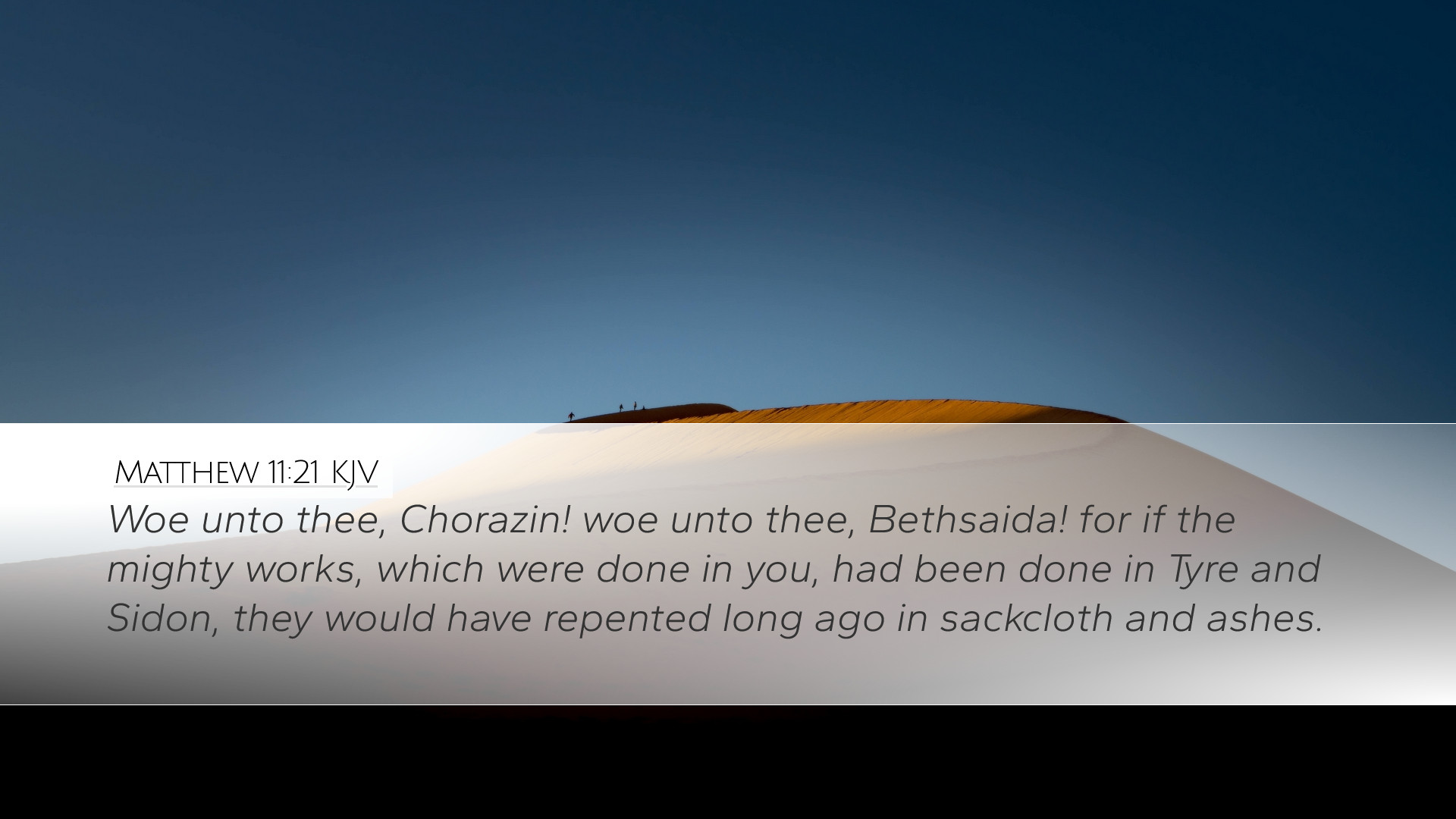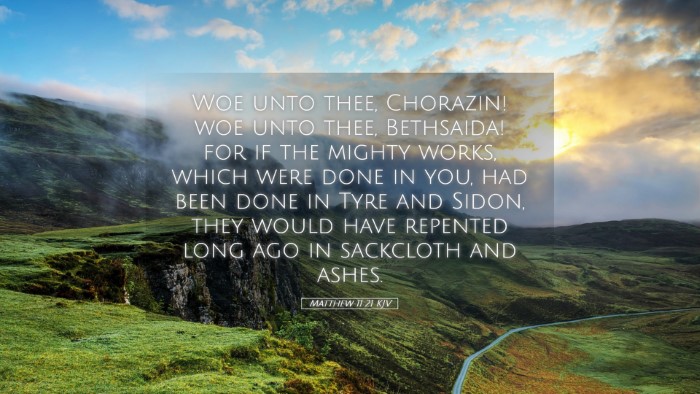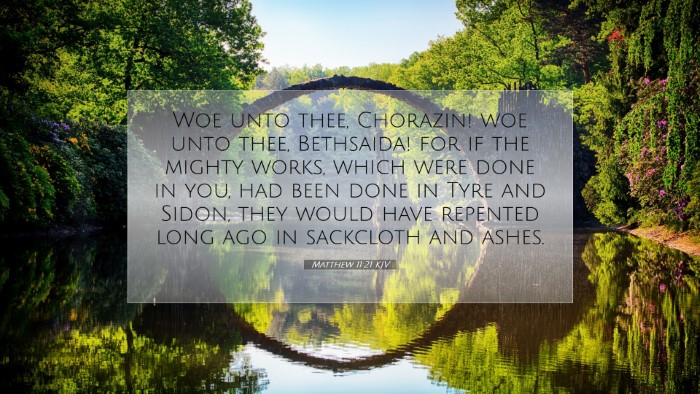Exegesis and Commentary on Matthew 11:21
Matthew 11:21 states, "Woe to you, Chorazin! Woe to you, Bethsaida! For if the miracles that were performed in you had been performed in Tyre and Sidon, they would have repented long ago in sackcloth and ashes." This verse forms part of a critical passage where Jesus pronounces woes upon cities that had witnessed His mighty works yet remained unrepentant. In what follows, we will explore the implications and theological significance of this verse by integrating insights from Matthew Henry, Albert Barnes, and Adam Clarke.
Contextual Background
The passage occurs in a moment of reflection for Jesus, following His ministry in Galilee. Matthew 11 presents the contrast between the expectations of the Messiah and the reality of His reception, particularly among those who had the most opportunity to know Him. The cities of Chorazin and Bethsaida were key centers of His ministry, yet they largely rejected the very revelations of God's power and love.
Matthew Henry's Insights
Matthew Henry emphasizes the severity of the rebuke, pointing out that "woe" signifies not merely distress but divine judgment. In commenting on Chorazin and Bethsaida, he notes that these cities enjoyed privileges unlike any in history; they directly witnessed miracles that attested to the divinity of Christ. He draws a parallel between their spiritual insensitivity and a lack of appropriate responses to grace.
Albert Barnes' Analysis
Albert Barnes elaborates on the concept of accountability before God. He interprets the mention of Tyre and Sidon (notorious for their wickedness) to highlight the gravity of the situation. If those notorious cities had been given the same signs and wonders, they would have repented with profound sorrow. This comparative scale of accountability is vital as it underscores the expectation of greater repentance among those who have experienced greater divine revelation.
Adam Clarke's Commentary
Adam Clarke takes a slightly different approach by focusing on the nature of repentance. He mentions the use of "sackcloth and ashes," which were traditional symbols of deep mourning and repentance in Jewish culture. Clarke insinuates that the lack of such heartfelt repentance indicates a grievous blindness over the spiritual state of Chorazin and Bethsaida. Here, Clarke amplifies the moral message: that privilege carries responsibility, and failure to recognize God's working leads to severe consequences.
Theological Implications
The verse encapsulates several profound theological themes including:
-
The Nature of Judgment: The woes pronounced by Jesus illustrate the seriousness of divine judgment tied to the rejection of revelation.
-
Grace and Responsibility: Those who experience God's grace are held to a higher standard in their response to it. The communities of Chorazin and Bethsaida epitomize how unreturned grace can lead to greater condemnation.
-
Comparative Repentance: Jesus' reference to Tyre and Sidon serves to reinforce that access to divine revelation should incite a sincere response in the hearts of individuals.
-
Cultural Context of Repentance: The imagery of sackcloth and ashes holds significant weight within the cultural milieu of ancient Israel, underscoring the necessity of an outward expression commensurate with genuine inward transformation.
-
Christ's Authority and Prophetic Voice: Jesus speaks as the authoritative prophet pronouncing curses, an echo of the Old Testament tradition of prophetic woes laid upon disobedient nations.
-
Missional Imperative: There is an implicit exhortation for contemporary believers to reflect on the realities of their communities and the call to declare the Gospel message earnestly.
Practical Applications
For pastors and theologians, this passage invites reflection on the current condition of their communities:
-
Self-Examination: Believers are encouraged to examine their own receptivity to the Word of God and the works of Christ in their lives.
-
Spiritual Vigilance: Emphasis on the need for ongoing repentance and avoiding complacency in spiritual matters, mirroring the example set by Chorazin and Bethsaida.
-
Commissioned Outreach: Understanding the urgent need to reach those who are spiritually blind or indifferent; carrying the message of repentance as did the prophets.
-
Community Engagement: Actively engaging with and challenging community members to respond to the Gospel with sincere repentance rather than indifference, reflecting on the deep societal needs around them.
-
Celebration of Grace: A reminder that much is required from those who have been given much; thus, cultivating a heart of gratitude and joy in response to God's grace should be paramount.
Conclusion
In conclusion, Matthew 11:21 serves not only as a historical account of Jesus’ judgment on certain cities but also as a timeless warning to all who encounter the miracles of Christ. The teachings echo through the centuries, beckoning believers to a posture of humility and repentance while recognizing the immense grace afforded to them. Scholars, pastors, and students should strive to apply these profound lessons in their own lives and ministries, ensuring that they heed the call to embrace repentance, live responsively to God’s grace, and engage fervently in their communities for the sake of the Gospel.


